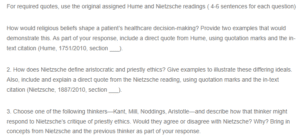Hume and Nietzsche on Ethics
Over the years, moral philosophers have had numerous debates on whether morality should be based on sentiment or reason. However, Hume concludes that an individual’s morality should be based on sentiment. According to Hume (1751/2010), “human actions cannot be accounted for by reason, but recommend themselves entirely to sentiments of mankind” (p. 186). Hume maintains that any moral judgment based on reason could be wrong or right, but we avoid disputes when we derive moral judgments from sentiments. In support of his argument, Hume presents the concepts of motivation and amiability. Using the concept of motivation, Hume argues that moral distinctions encourage action because reason by itself is not a sufficient factor for action; hence people must develop sentiments of desire, aim, or want before an act (Hume, 1751/2010). While describing the concept of amiability, Hume argues that “virtue belongs to be amiable, and vice odious” (Hume, 1751/2010, p. 154). Therefore, morality makes us develop certain feelings, such as hate or love; hence such feelings cannot be produced by reason alone. Hume’s argument is convincing because his view of amiability means that we can only use reason to determine matters of fact and relations between one thing and the other. Therefore, reason is an insufficient tool in disapproving or approving an action.
In Geneology of Morality, Nietzsche defines the origin of moral thought and morality by challenging dominant moral beliefs, including aristocratic and priestly ethics. According to Nietzsche (1887/2010), aristocratic values are characterized by good, rich, blossoming health and a powerful physicality that includes jousting, dancing, hunting, adventure, war, and all the things associated with a happy, free, and decisive action. In contrast, priestly ethics focus on the evil done by other people, causing a distraction to those willing to improve themselves and enjoy the present (Nietzsche, 1887/2010). Therefore, the view of morality was redirected from “good versus bad” and became a comparison between “pure and impure.” Marino (2010) argues that priest ethics might have emerged as a response to aristocratic beliefs hence becoming its greatest critic and opposition. Nietzsche’s argument that Christian and Jewish ideals resulted in slave morality due to their impact on aristocratic beliefs is not convincing. Nietzsche (1887/2010) argues that priests characterized warriors and powerful warriors as evil, secular, and lustful as they considered the ascetic, humble, and impoverished lives as “good and holy.” Therefore, Nietzsche views a pure life as one that excludes certain habits such as war, violence, or sex. Nietzsche believes that such characteristics form the basis of a ‘tame man’ that is “unedifying and incurably mediocre” (Nietzsche, 1887/2010, p. 293). I do not concur with Nietzsche’s argument because people becoming tame and humble is not enough justification for the decline of humanity.
While Nietzsche views the decline of humanity as a result of priest ethics, Mill perceives this as conformity. According to Mill (1863/2010), society prefers conforming naturally in response to social and legal realms. Therefore, Mill suggested that for individuals to be free, they need to discover their inner selves through self-experimentation and live for that. While developing insight into slave morality, Nietzsche believed that people couldn’t discover themselves without oppression (Nietzsche, 1887/2010). This implies that people must compare themselves with others to discover themselves. Therefore, Mill would agree with Nietzsche as he suggests that while humans are considered good or bad based on their obedience, non-conformists could live a better life. In simpler terms, diversity is critical in promoting social progress and challenging societal norms.
References
Hume, D. (2010). An inquiry concerning the principles of morals. In G. Marino (Ed.), Ethics: The essential writings (pp. 152-187). Modern Library.
Marino, G. (2010). Ethics: The essential writings. Modern Library.
Mill, J. S. (2010). Utilitarianism. In G. Marino (Ed.), Ethics: The essential writings (pp. 228-255). Modern Library.
Nietzsche, F. (2010). On the genealogy of morality. In G. Marino (Ed.), Ethics: The essential writings (pp. 277-300). Modern Library.
ORDER A PLAGIARISM-FREE PAPER HERE
We’ll write everything from scratch
Question

Hume and Nietzsche on Ethics
For required quotes, use the original assigned Hume and Nietzsche readings ( 4-6 sentences for each question)
How would religious beliefs shape a patient’s healthcare decision-making? Provide two examples that would demonstrate this. As part of your response, include a direct quote from Hume, using quotation marks and the in-text citation (Hume, 1751/2010, section ___).
2. How does Nietzsche define aristocratic and priestly ethics? Give examples to illustrate these differing ideals. Also, include and explain a direct quote from the Nietzsche reading, using quotation marks and the in-text citation (Nietzsche, 1887/2010, section ___).
3. Choose one of the following thinkers—Kant, Mill, Noddings, Aristotle—and describe how that thinker might respond to Nietzsche’s critique of priestly ethics. Would they agree or disagree with Nietzsche? Why? Bring in concepts from Nietzsche and the previous thinker as part of your response.

